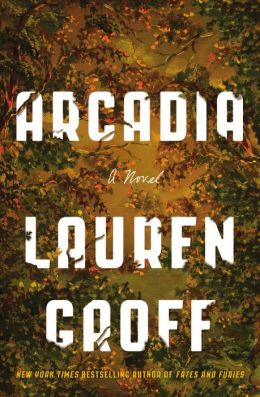The first half of Lauren Groff's novel Arcadia places itself, and its protagonist, Bit Stone, firmly in the traditions of the American novel, as Bit, like Huckleberry Finn and Jim Burden and so many other American children before him, lives under the vastness of the sky, in the arms of the natural world, and with the promise of a better life of real equality ever just before his grasp:
For a few breaths he forgets himself in the swim of nature around him. Its rhythm is so different from Bit's human own, both more nervous and more patient. He sees a bug that is smaller than a period on a page. He sees the sky, bigger than all that's in his head. An overwhelm from two directions, vast and tiny, together.
The second half of the novel loses Bit to modern life, and as he wanders his way back towards this connection to the land and to his childhood, loses itself a bit, too. Like Bit himself, apart from Arcadia itself, Groff's novel becomes just a bit ordinary:
On the days that he swings through the city on his walks, he can almost grasp what they lost...It was the story they had told themselves from the moment the Dutch had decanted from their ships onto the oyster-strewn island and traded land for guilders: that this place filled with water and wildlife was special, rare, equitable...That this equality of purpose would keep them safe.
Arcadia is a commune in the forest and fields of New York in the 1970's. It is peopled with mythic hippies, included Bit's compelling and fully-realized parents, Hannah and Abe. Born three month premature, tiny Bit grows up in the womb of this not-untroubled, yet gorgeously idyllic world where through his wide and transcendental eyes Groff's reader is brought fully into Arcadia's spell. These years of Bit's life are a reading experience I will not soon forget.
But as utopias must, Arcadia falls, and Bit is sent out into the real world. In the same way that Bit never finds himself quite at home in New York City's streets, the novel itself never regains its purity and focus, wandering as Bit does through modern life without much sense of larger purpose.
Groff's prose gets distracted by a 2018 flu epidemic that has the world on quarantine and that pushes Bit back into the arms of Arcadia. But in a fiction landscape where it seems almost every protagonist finds himself with a similar crisis on his hands, I find myself wishing that Groff, like Arcadia's inhabitants themselves, had kept things more simple.
I wholeheartedly recommend that you read Arcadia. Its spell is powerful. But it will be broken sooner than you wish.
Which I guess might be exactly the point.


No comments:
Post a Comment